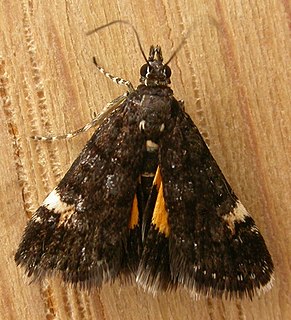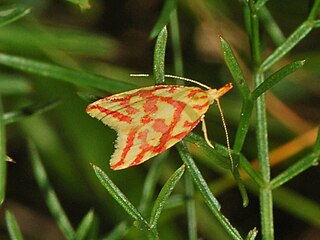
Giovanni Antonio Scopoli was an Austrian physician and naturalist. His biographer Otto Guglia named him the "first anational European" and the "Linnaeus of the Austrian Empire".
Ebbe Schmidt Nielsen was a Danish entomologist. Nielsen was influential in systematics and Lepidoptera research, and was an early proponent of biodiversity informatics. The journal Invertebrate Systematics was established with significant contributions from Nielsen and he assisted in the founding of the Global Biodiversity Information Facility (GBIF). Nielsen authored several books, published over eighty scientific papers, and was highly regarded within the scientific community. Following his death, the GBIF organised the Ebbe Nielsen Prize in his memory, awarded annually to promising researchers in the field of biodiversity informatics. The moth Pollanisus nielseni is dedicated to Nielsen.
Copromorphidae, the "tropical fruitworm moths" is a family of insects in the lepidopteran order. These moths have broad, rounded forewings, and well-camouflaged scale patterns. Unlike Carposinidae the mouthparts include "labial palps" with the second rather than third segment the longest. With other unusual structural characteristics of the caterpillar and adult, it could represent the sister lineage of all other extant members of this superfamily. The genus Sisyroxena from Madagascar is also notable for its unusual venation and wing scale sockets.

Cauchas rufimitrella is a diurnal lepidopteran from the family Adelidae, the fairy long horn moths. It is found in almost all of Europe, except Portugal, Ukraine and the southern part of the Balkan Peninsula.

Gnorimoschema is a genus of moths in the family Gelechiidae.
Pseudotelphusa is a genus of moths in the family Gelechiidae.

Siona lineata, the black-veined moth, is a moth of the family Geometridae. The species was first described by Giovanni Antonio Scopoli in his 1763 Entomologia Carniolica.

Heliothela is a genus of moths of the family Crambidae.

Zanclognatha is a genus of litter moths of the family Erebidae. The genus was described by Julius Lederer in 1857.

Dichrorampha is a genus of moths belonging to the subfamily Olethreutinae of the family Tortricidae.

Entomologia Carniolica exhibens insecta Carnioliae indigena et distributa in ordines, genera, species, varietates is a taxonomic work by Giovanni Antonio Scopoli, published in Vienna in 1763. As well as describing hundreds of new species, Entomologia Carniolica contained observations on the species' biology, including the first published account of queen bees mating outside the hive.
Ypsolopha is a genus of moths of the family Ypsolophidae. It is the type genus of the family and comprises over 120 described species.

Hypercallia is a genus of gelechioid moths.
Cauchas cockerelli is a moth of the family Adelidae or fairy longhorn moths. The species was recorded by August Busck in 1915. It is generally found in North America, including Colorado.
Cauchas cyanella is a moth of the family Adelidae or fairy longhorn moths. It was described by August Busck in 1915. It is found in North America, including Ohio.
Cauchas sedella is a moth of the Adelidae family or fairy longhorn moths. It was described by August Busck in 1915. It is found in North America, including Colorado.









